Maestro
Bravo!
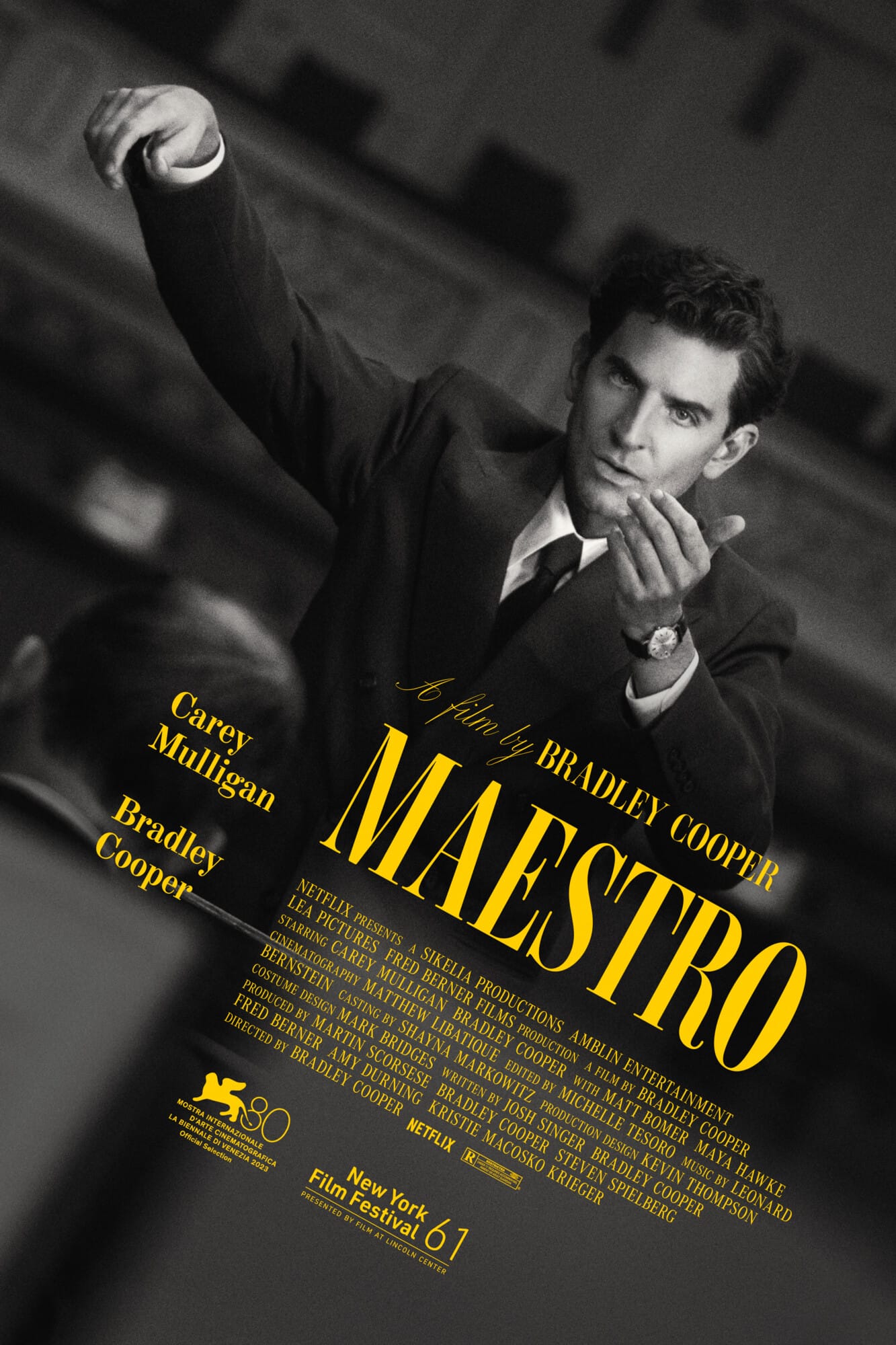
Maestro details the life and times of famed American conductor Leonard Bernstein, and his long, tumultuous relationship with the actress Felicia Montealegre.
So, I obviously watch a lot of movies, and normally, unless I’m hearing from a few different trustworthy places that they’re something special, there’s generally five types of films that I choose to avoid…
1. Christian mythology/glorification stories, especially when they’re about colonizing missionaries “heroically” invading somewhere to spread the “good” word.
2. Plucky “loser sports team does good” movies, whether it’s the comedic or dramatic versions of that story.
3. Anything about some depressed white guy and the manic pixie dream girl who teaches him to live again.
4. Any Oscar bait film about a character struggling with their addiction.
And finally… 5. Music bio-pics.
Also, this isn’t a genre, but I refuse to see the movie Air. it just looks too dumb. The trailer looked like a Saturday Night Live parody of bombastic Oscar bait films. Just a nonsense fucking topic acting like it’s the cure for cancer. Fuck you. God damn it. I hate it so much, and only partially because of Affleck’s stupid hair too. I don’t care if it’s historically accurate. It looks dumb. It all looks dumb. I refuse to watch it.
But I’ve wandered a bit from the topic, so I digress…
I bring all this up to say that this isn’t always true, of course. There’s definitely some fantastic examples of these particular genres out there, films that I love… like Noah, or The Mighty Ducks, or The Professional, or Trainspotting, or Purple Rain, for example. It doesn’t happen often, but it does happen. That having been said, for the most part, for me at least, these particular types of movies are guaranteed ass, and I’m just not interested in their shit.
So imagine my surprise when Maestro turned out to be one of those exceptions.
This was definitely not something I was expecting. This film basically touts itself as the passion project of a very well-known, very successful, and very rich celebrity/actor, someone who lives a life within a bubble of extreme deference and privilege, someone most likely surrounded by Sycophants and Yes-Men, people whose entire jobs depend on the fact that they never tell the celebrity/actor no—a situation you can always tell is happening once an actor starts wearing a bunch of big clunky rings and weird scarves. And not only is this rich, privileged, and beloved-by-the-masses actor starring in their passion project, they’re also the writer and director. Often times, this kind of situation is like the cinematic version of a frozen lake with a “Danger! Thin Ice!” sign stuck in the sand at the shore… there’s usually trouble ahead. Especially when the subject is a real “I’m… ACTING!” type of role, with heavy make-up and super dramatic moments, like when the actor is portraying the tumultuous life of a very well-known and very distinctive personality.
…Like a famous musician, for instance.
So, I was wary. I really only watched Maestro because I’m trying to watch all of the Best Picture nominees before the big night. If not for that, I would’ve been in much less of a hurry to see it, but… yeah, it was pretty good.
Or at least, pretty decent.
Covering a nearly 50 year chunk of Leonard Bernstein’s life, this project was with Steven Spielberg for years, but he dropped it to remake West Side Story, which might be Bernstein’s most well-known piece of work. According to Hollywood legend, after Spielberg saw the Bradley Cooper directed film A Star is Born—a film I didn’t bother seeing for many of the reasons I mentioned above—Spielberg insisted that Cooper be the one to direct this project.
I don’t know if I completely believe that story. I’m sure it’s mostly true, but it also sounds like your pretty bog standard Oscar Nomination Press Tour narrative. Either way, Maestro managed to snag seven Oscar nominations for Best Actor, Best Actress, Best Makeup & Hair, Best Cinematography, Best Sound, Best Original Screenplay, and of course, Best Picture.
And I’d say they’re mostly pretty well-deserved.
Pretty well deserved, despite falling into the same trap that trips up most biopics, especially the ones with major award aspirations: It just covers too huge a swath of an extremely famous person’s extremely noteworthy life, and as a result, due to the time jumps required to cover that much ground, it ends up feeling a little superficial.
This isn’t a total dealbreaker though, because so much of the film truly is great.
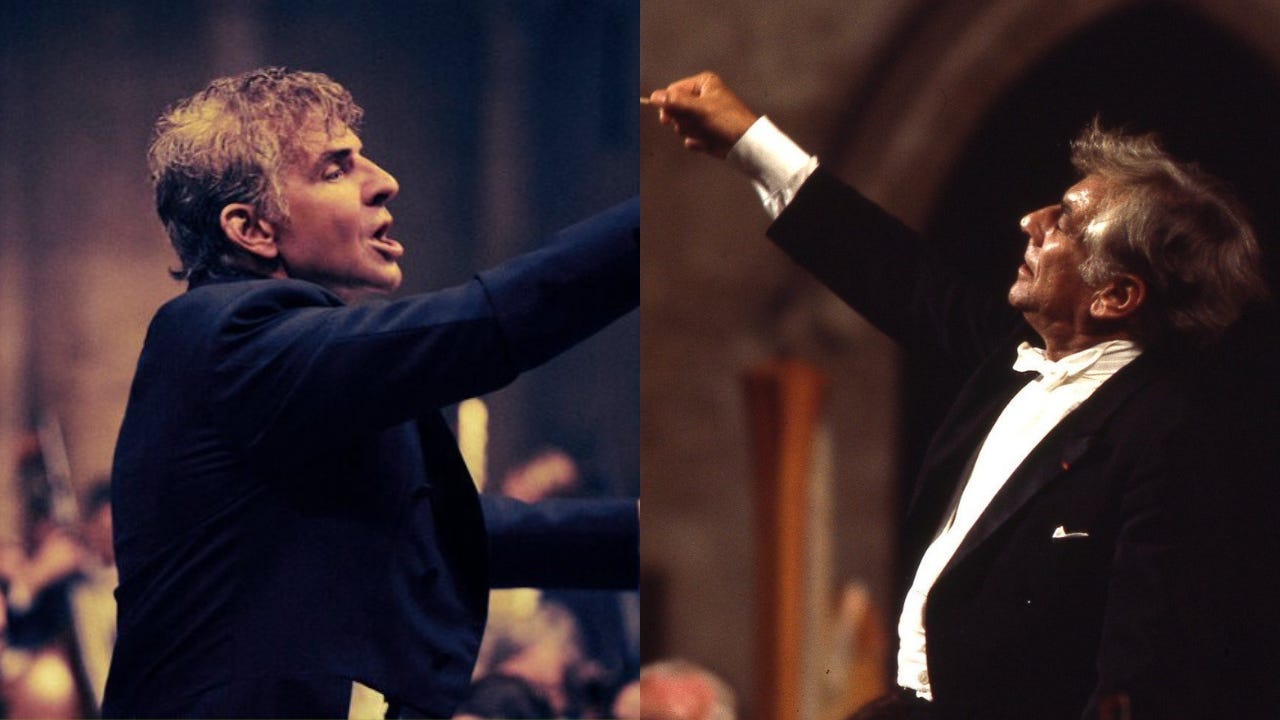
Cooper throws his all into being Bernstein, and clearly put a lot of effort into getting all of the details right too, apparently even spending six years learning how to conduct a six minute recreation of Bernstein leading the London Symphony Orchestra in 1973. Bernstein was also a well-known character, someone fully aware of his own brilliance, so he was a person who was always “on.” Cooper is fantastic as this, but if a character is always performing, this persona is all the audience sees too, meaning there’s only a few glimpses of who they truly are as person. What we do see is amazing, including a heartbreaking goodbye, as a closeted gay man, that Bernstein shares with a boyfriend, but other than that… there isn’t a whole lot of insight as to who the man really was.
It’s not a bad script per se. It’s certainly entertaining, but still, bounding across the years of a person’s life, and stitching them together into a narrative, can easily hit the big moments, but it rarely gives the small ones their fair due.
It’s hard to tell if this charming, artful, and droll center-of-everything, this terminally selfish and legendarily talented character, is who he truly was as a person, or if it was merely who he allowed others to see, especially on record. And as a result, was that all Cooper was able to see while creating the character? Either way, as a result, Bernstein remains a somewhat frustrating cypher in this film.
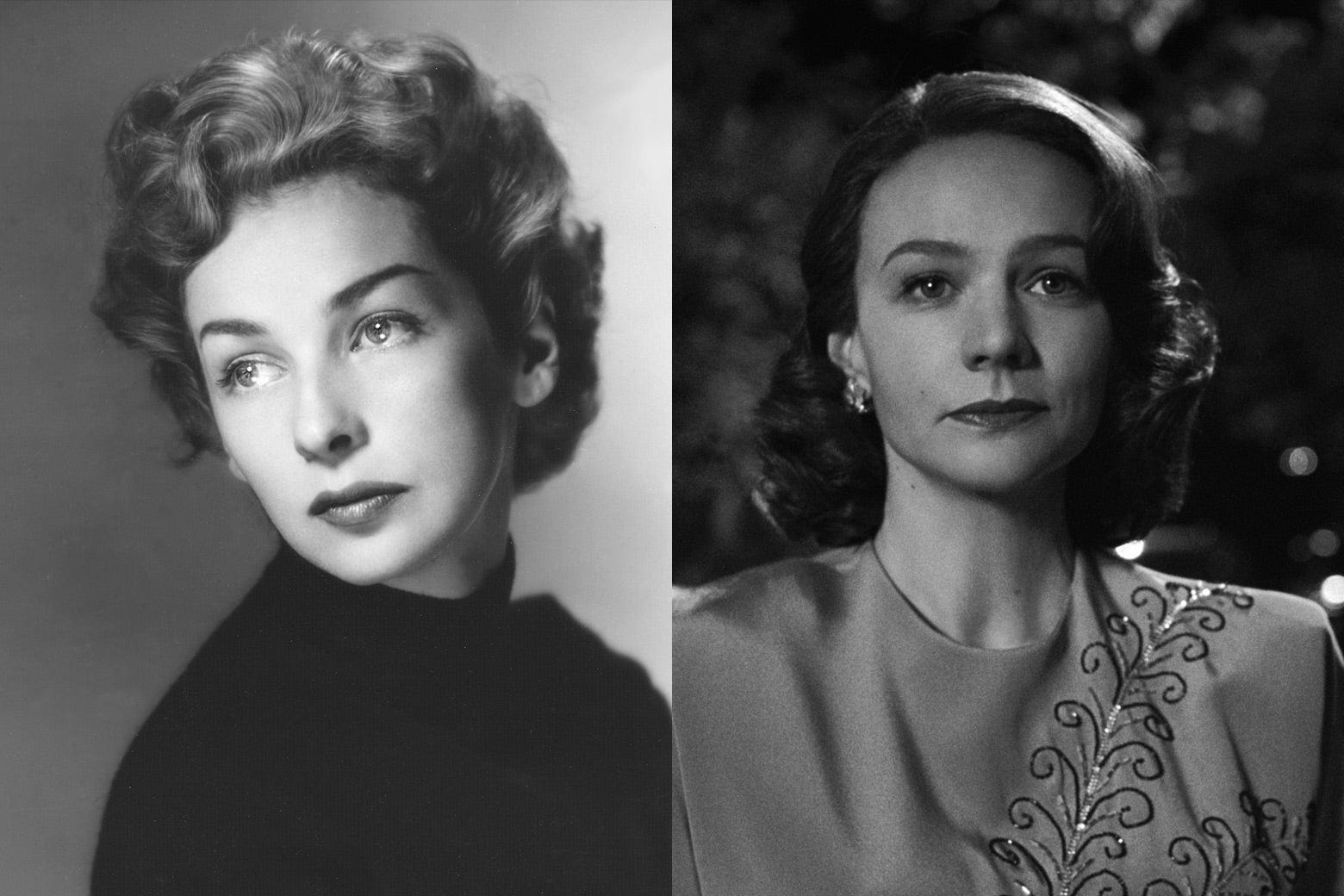
Meanwhile, Carey Mulligan’s performance as Felicia Montealegre is truly fantastic. It is yet another phenomenal performance this year in a Best Actress Nominee pool that is already filled with phenomenal performances. Felicia and Bernstein had a complex relationship too, but here as well, the film somewhat frustratingly rarely goes beneath the surface. It is a complicated relationship of love, quiet dissatisfaction, and rampant selfishness, and the small glimpses of the hope that Felicia holds within her, the hope that she would be Bernstein’s only focus, and the hurt that she feels, over and over, as she is reminded that his focus will always be him, and only him, is just incredible, but while those small glimpses of pain that she allows to show on her face speak volumes, much like Bernstein, she’s otherwise a bit inscrutable.
It’s truly a pair of very worthy roles for a pair of talented actors to dig into. Together, they share an infectious chemistry, and we get to enjoy long scenes of them bonding and falling in love, mirroring the later long scenes they share as the couple argues and fractures, and ultimately, say goodbye. It all feels very genuine and real. They’re lovely together, and the pain they both go through will tug at your heart. It’s a weird feeling, being very satisfied by these amazing performances, while also being aware of how the script glosses over so much context of not only who these very famous people were, but why they were the way they were.
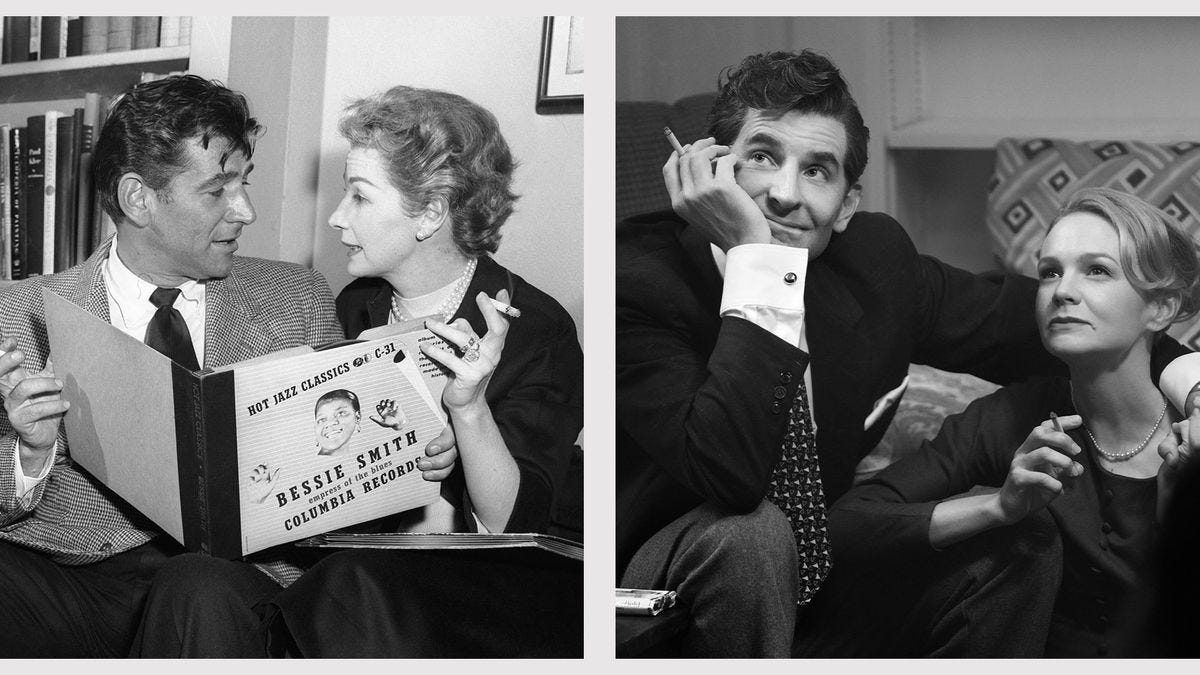
Still, it’s definitely a film worth watching.
Visually, it’s spectacular. Cooper uses cinematography, costumes, and production designs reminiscent of the various eras throughout the nearly 50 years of Bernstein’s life the film covers, from the frankly beautiful high-contrast blacks and whites of the 40s and 50s, to the vibrant Technicolor of the 60s and 70s, Cooper is really taking a lot of chances here, and they pay off, clearly illustrating the changes in time and era in Bernstein’s life. It’s good work, and if some of those directorial choice may feel a tad overly-flourished, maybe even heavy-handed, like when a tiny little Felicia is literally standing in Bernstein’s massive and looming shadow, I feel like it can be forgiven, especially given the subject’s larger-than-life personality, and his very dramatic personal oeuvre.
There’s a lot to be said about the make-up too. First of all, it’s extraordinary, but I think the real question is…
Is all of it even necessary?
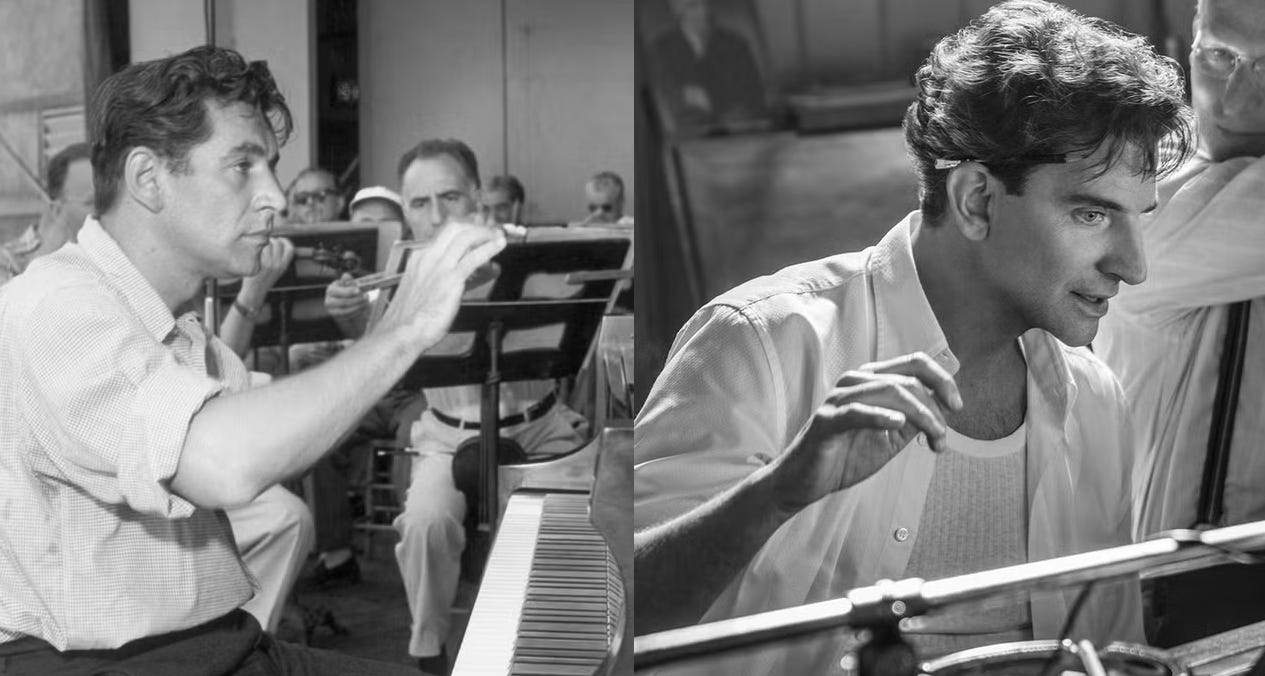
There was a small bubble of controversy over Cooper wearing the fake nose and ears for the role, and the implied antisemitism of that, and while it seems like it’s mostly subsided, especially once Bernstein’s own children weighed in to support Cooper, after seeing the film myself, I have to wonder why he even bothered.
I mean… Is there anyone out there who’s seriously worth listening to going: “That’s not Bernstein! He doesn’t have the nose.” I honestly didn’t even really notice the ears and nose during the film, certainly not as them being somehow noticeably larger than any “normal” person’s. Would I have noticed if Cooper had simply not worn them at all? Would anyone? Especially anyone younger than me?
I seriously doubt it.
To me—and not to imply anything about Bradley Cooper specifically, someone I obviously don’t know at all—this whole fake nose idea seems like it’s coming from the same place that is the reason why we still have white people doing blackface every god damn year. Simply put, these racial differences they see are so important to them, so primary in how they define themselves and others, with how they see the world, that they are simply incapable of imagining dressing up as someone like… Beyoncé, for instance, without first painting their bodies in a vague resemblance of her skin color, because that’s the only detail that truly matters to them. It’s almost treated the same way that an alien character is: “I can’t play that part without being green, or without wearing a weird nose or ears or a bumpy forehead or something… How else will the audience know that I’m an alien and not a human being?”
And to that, people say: “well, his kids agreed with the decision!” Of course they did. Take a moment and ask yourself a pair of follow up questions… who benefits from any renewed interest in Bernstein’s music that results from this film? Also, what do you think they’re doing with their own lives now? I certainly don’t know, but I’d be willing to bet that a big chunk of it is enjoying the passive profit stream that is generated by ol’ Lennie’s name, right? So, what else would they do? What else would anyone do? Why wouldn’t they agree?
It’s an uncomfortable situation, one that demands a little examination, especially of the people involved, the ones who “innocently” paint themselves black for Halloween, or wear a war bonnet or a bindi mark as fashion, or a big nose when playing the role of a Jewish man, with the unavoidable reality being that the only answers that are going to be found are also pretty uncomfortable.
In the end, despite a few stumbles, Maestro is a good film, one I really liked, even if it is a music bio pic. It has fantastic performances. It looks great. The music is obviously amazing. It’s really good, but maybe not quite great.
I will say that, as great as Mulligan is, and she truly is great, I don’t think she’ll beat the rest of the field. I think the same goes for Cooper too, and the script just isn’t up to par either. I don’t expect this film to win any Oscars really, except maybe makeup, because the old man Bernstein work is really good. That having been said, if does win for makeup, it will probably get overshadowed by the nose controversy coming back to the surface. But who knows, maybe I’m wrong.
I guess we’ll have to wait and see.
